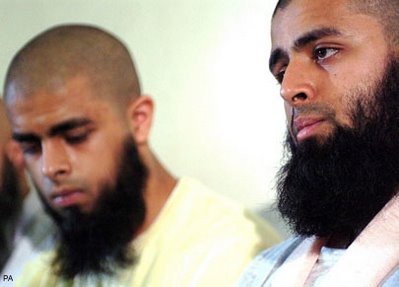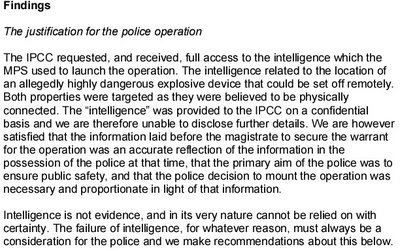Comparing and contrasting the ex-BNP bomber and the Koyairs.
 In one of those more happy, not conspiratorial coincidences, the release of the second IPCC report in the police raid on the home of the Koyair brothers and their neighbours (PDF) has nicely complimented the guilty plea of Robert Cottage, a former BNP member, who has pleaded guilty to the possession of explosives.
In one of those more happy, not conspiratorial coincidences, the release of the second IPCC report in the police raid on the home of the Koyair brothers and their neighbours (PDF) has nicely complimented the guilty plea of Robert Cottage, a former BNP member, who has pleaded guilty to the possession of explosives.When police raided his house on 28 September 2006 they discovered 21 types of chemicals which, when combined, could form explosives.
Miss Blackwell said they also uncovered a document called the Anarchy Cookbook, which detailed how to make different types of bombs.
Ball bearings - which the prosecution claim could be used as shrapnel for explosive devices - were also found, along with four air pistols.
After interviewing Mr Cottage, detectives raided Mr Jackson's home on 1 October and found a bow and arrow and two nuclear protection suits.
Up until now, the mass media has been almost silent on this discovery, which at the time was referred to by the local media, around the only part of the fourth estate apart from blogs that reported on the raid, as the biggest ever seizure of bomb-making materials from one home in the country.
Before we get into denouncing the double standards of media, knowing full well if it had been Muslims who had been found with such material instead of two white men that it may well have led the news agenda for a couple of days, Rachel makes a number of good points based on her own digging into the story. It simply seems that it passed the media by - if they had known about from the beginning, they would have made something of it. As it happened, the police also initially played down the raids, so it seems only the local media took any interest, and didn't pass it on to their colleagues in the national press.
The one thing that grates though is the fact that the police seem to have accepted that Cottage was not planning a terrorist attack, and only charged them under the ancient (1883) Explosive Substances Act. Cottage's claim that he believed civil war was coming, a belief similar to those held by extreme-right survivalist militias in the United States, and that he was keeping explosives ready for it, shouldn't be allowed to wash. You can't imagine Islamist extremists getting away with such an excuse in court, nor would the tabloids allow them to.
At least in the case of Cottage and his friend David Jackson, justice seems likely to be done. When it comes to the Koyair brothers, their family and their neighbours, they will go on waiting. While today's second IPCC report is not a whitewash, and is far more critical of the police operation in Forest Gate than Scotland Yard are admitting, as Martin Kettle points out, it still leaves a good few questions. The main one surrounds the intelligence that triggered the raid in the first place. The report says (image because the report doesn't allow text copying for some reason):

As the intelligence has only been provided on a confidential basis, unless it happens to be leaked, it seems we're destined to never know for sure just exactly what the police were expecting to find other than a "highly dangerous explosive device" or a "remote-controlled chemical bomb". The media reports at the time were similarly unsure of what it was the police were looking for. The Daily Mail and Times suggested it was a suicide vest that would also have sprayed out poison, the Sunday Express screamed "ANTHRAX TERROR BOMB HUNT", while the News of the Screws, in the same story that wrongly claimed that one of the brothers had shot the other, reported that it was an "explosive device designed to spray out deadly cyanide".
If the police had been willing to be truly open, they would have released the intelligence in full, with any details which could have identified the source censored. Instead we have to take the IPCC's word for it that the intelligence was both believable and so troubling that it necessitated a raid that was brutal in its execution. It's also worth considering this initial Grauniad report that suggested there had been two months of surveillance before the raid -- how in two months did they not realise that this was an ordinary family with nothing to hide who have since been treated abysmally?
There are also contradictions between the evidence given by the officer identified as hitting Hanif, one of the residents of the adjacent house to the one owned by the Koyair family, and his own account of what happened. Hanif contends that he was hit with the butt of the officer's gun as soon as the police entered the room where he had been sleeping -- the officer maintains that Hanif was failing to comply with directions, and he was afraid he was reaching for something under his bed. The officer in any case falls back on the excuse that he was operating in the face of "extreme threat", even though this was a raid carried out in the early hours of the morning, where all the occupants of both houses had been asleep until the police entered, and that he was operating in the property that was raided only because it was believed that both were connected. While the house was owned by the Koyair family, there was no way to gain access to one from inside the other.
The report does mention the leaking and coverage of the raid, but as commenting on such things is outside its remit, doesn't draw any conclusions. It would have been nice for the IPCC to investigate where the leaking came from, but that seems to have been too much to expect. Instead, we have to draw our conclusions, and judging by the way the Murdoch press in particular set out to "get" the Koyair brothers, suggesting that one of them had a criminal record when he did not, that they had a suspiciously large amount money in cash, even though the family had explained they had it because of their religious belief in not using bank accounts which accrue interest, and then finally, and most damagingly, that one of the brother's computers and phones' had child pornography on. When the CPS failed to prosecute and it emerged there were a lot of questions over just how the pornography appeared on the devices, the Sun still persisted, with an officer telling it that "the images were there and a jury should have decided how they get there".
No one disputes that if there is a clear case of public safety being threatened, then such disruptive and potentially personally destructive raids have to take place regardless of such concerns. However, as the report sets out, the police made little to no allowances for the intelligence being incorrect, and the officers acted throughout almost as if they were above the law. The way in which the media were leaked such defamatory and completely inaccurate information shows the contempt in which the men were treated. They were guilty until proved innocent, and it seems that the police were so determined to find something to use against them that they may have even turned to planting child pornography, something which cannot be proved, but in the circumstances of the operation cannot be easily dismissed as being laughable or conspiratorial.
One can only hope that the recommendations of the report are taken on board. That the events of the last couple of weeks seem to have repeated history, only this time with the Home Office coming under suspicion for the leaking, and with a number of the men accused of terrorism being charged, certainly doesn't inspire confidence in either the police or government to restrain themselves when dealing with such sensitive operations.
Labels: BNP, David Jackson, Forest Gate terror raid, IPCC, Koyair brothers, Robert Cottage
Post a Comment